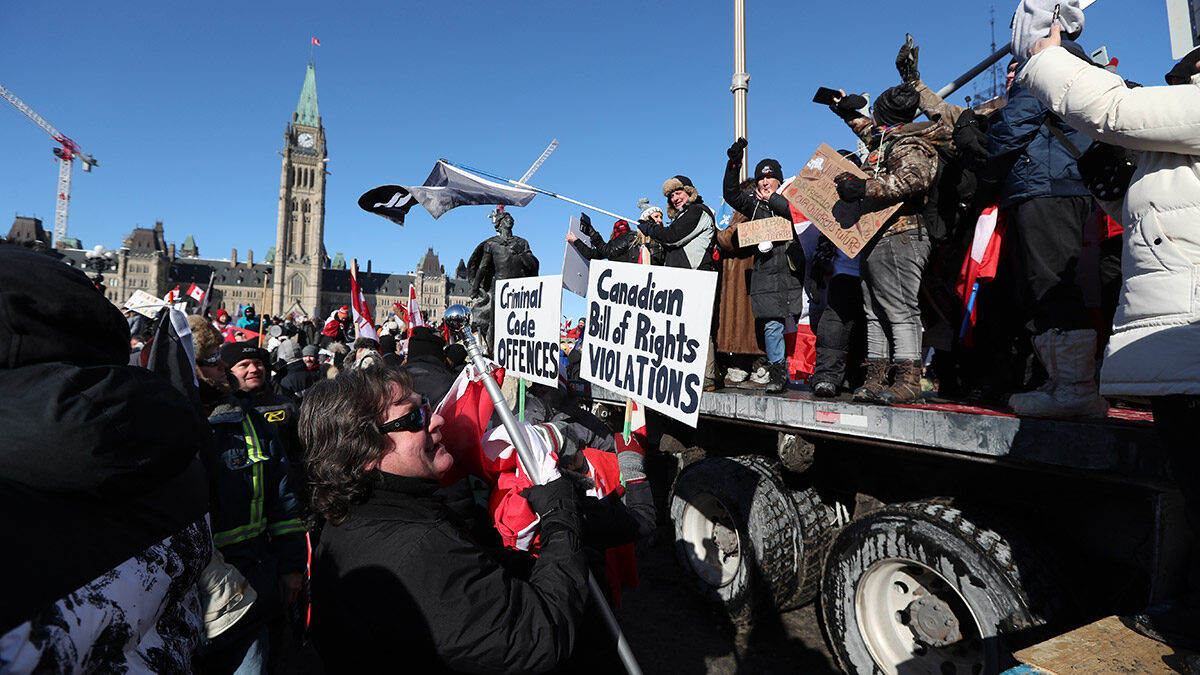The “freedom convoy” occupation of Ottawa may have occurred eight months ago, but locals are making it clear time has not healed the harm done.
The Ottawa People’s Commission (OPC) on the Convoy Occupation recently held its first hearings in Centretown and Lowertown, where residents recounted sleepless nights, harassment by convoy members and inaction on the part of Ottawa police during the February occupation of the city core by truckers and others protesting COVID restrictions. The commission will hold three more online hearings — Wednesday, Oct. 12 and Oct. 20.
Created as a way for residents to share what they experienced during the occupation, the citizen-led coalition aims to release a final report by early 2023.
The report will be informed by OPC hearings from September to December and include recommendations on healing communities and regaining trust. It will be sent to the City of Ottawa, provincial authorities, the federal government and will be available to the public.
Other investigations are also underway, including the investigation by the city’s auditor general into the impact of the convoy, and the federal government’s Public Order Emergency Commission, the federal investigation on the use of the Emergencies Act. A parliamentary committee also has been holding hearings.
However, OPC organizers say they are taking a unique approach to their inquiry.
“I think it’s very important to emphasize that this commission is different; It’s a people’s commission, so it’s more like a grassroots initiative. We have no government funding,” said Monia Mazigh, one of four commissioners leading the OPC.
“The other commissions, they have their own objectives. … I always see this more from complementarity; we complement each other. We fill what is not being filled already by the commission or any other commission,” she said.
The OPC focuses on hearing directly from people affected by the convoy, something the commission says is not at the forefront of the other investigations.
Five individuals spoke during the first hearing on Sept. 21. The first witness, a 72-year-old Centretown woman who was not identified, described her inability to sleep for more than a week and said she even found human feces near her home.
“Shutting down the streets, terrorizing citizens in their own homes, leaving businesses with no choice but to close their doors — some of which will never recover their business — and making a mockery of our judicial system while demanding our prime minister and his government be handed over to them is not a demonstration, let alone a peaceful one,” she said in her testimony.
A Centretown resident known only as Matt shared his experience counter-protesting.
“We saw photos circulating of people waving swastika flags, cultural appropriation of Indigenous practices, Trudeau hanging by rope. We saw banners … of white nationalist hate groups. We saw widespread harassment of mask wearers in our community and several instances of public intoxication, urination and defecation,” said Matt.
“The police stood idly by and did nothing,” he said.
Feeling that the city and Ottawa police were not acting, Matt said he took matters into his own hands by protesting on Parliament Hill. He held a sign that read, “We will not be held hostage in our own city.”
Matt says police told him they could not guarantee his safety if he remained on the Hill.
The commission will also hear from people who felt there was a positive impact from the convoy occupation, said Alex Neve, another of the four commissioners.
“The People’s Commission does expect to hear, both in person and through written submissions, from individuals who may have been supportive of and even actively involved in protests and other activities associated with the Convoy Occupation,” he said in an email. “We welcome those views. Our focus, however, remains on the community impact of the convoy. That means we are only interested in hearing from convoy supporters who actually live or work in the neighbourhoods that were affected by the occupation and are in that sense members of the community.”
He added: “Our focus is on impact, not on the legitimacy or not of the convoy’s message or ideological views.”
Mazigh said she was unaware of whether the Ottawa Police Service (OPS) or Mayor Jim Watson will participate in the people’s commission. The police service did not respond to Capital Current’s inquiries before publication.
Watson’s press secretary, Patrick Champagne, said the mayor “is not involved in the People’s Commission, and he will not be commenting publicly while various bodies are pursuing their independent investigations” of the truck convoy and of its impact.
Capital Current also reached out to the Ottawa Coalition of Business Improvement Areas (BIAs) to ask if local businesses would be participating in the OPC investigation, but did not receive a response by deadline.
But the OPC told Capital Current that it expects to organize a session in November aimed at hearing from local businesses.
The first set of hearings was open to the public, with community members arriving to show support and learn about the OPC.
Katie Zwiers, an 18-year-old University of Ottawa student, attended one hearing on Sept. 22. She said it was crucial for her to get involved in the community and to hear the “less heard voices of those impacted by the events early this year.
“I hope that all the stories detailing the inaction of police and government (are) made known so that real change can happen within the system. I hope that people feel empowered and heard like I did,” she said.
The commission will hold more online hearings: on Oct. 5 and 12 from 7 p.m. to 9:15 p.m. and Oct. 20 from 2 p.m. to 4:15 p.m. You can visit the OPC website for more information on future events, to donate, or to have your story heard.




